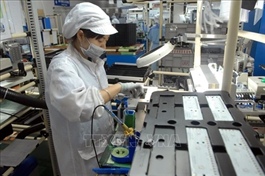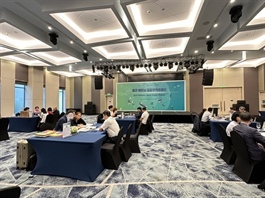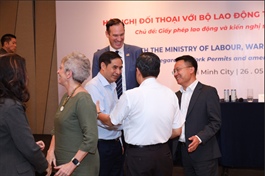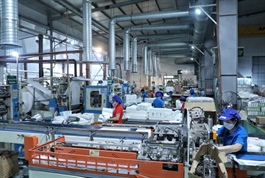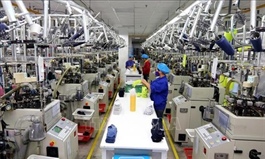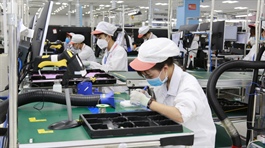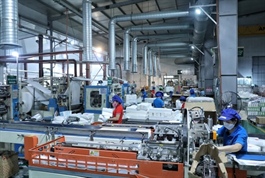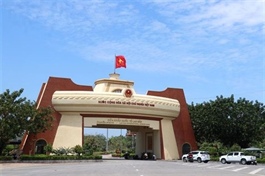Viet Nam jupms 12 spots in business environment rankings
Viet Nam jupms 12 spots in business environment rankings
Viet Nam jumped 12 places in the Economist Intelligence Unit (EIU)’s latest business environment rankings which measure the attractiveness of doing business in 82 countries with 91 crucial indicators.
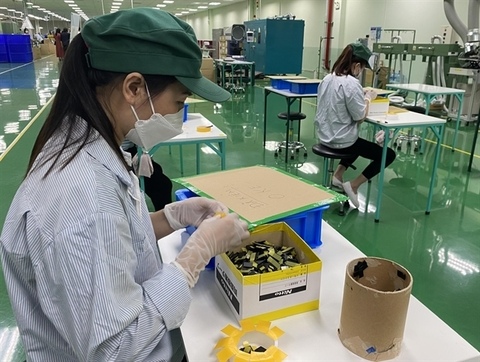
A factory of Tsuchiya Tsco Co in the northern province of Vinh Phuc. Viet Nam has shown a significant improvement in business environment. — VNA/VNS Photo Nguyen Thao |
According to EIU, Viet Nam, along with Thailand and India is among Asian countries that have improved their ranking the most over the past year.
"Viet Nam is our overall biggest mover worldwide, climbing 12 spots in the rankings, while Thailand improves by ten places and India by six," the EIU said in its report.
"Viet Nam and Thailand, which have favourable policies for foreign investors, are benefiting from firms pursuing a China+1 policy of having supply chains in both China and another Asian market."
"Viet Nam’s score rises on the back of an improving economic outlook, and Thailand’s as a result of greater economic stability," it said.
It added that Singapore has retained its position as the best business environment over the next five years while Australia, Taiwan (China) and South Korea ranked in the global top 20.
"As a region, Asia’s score for policy towards foreign trade is improving. This partly reflects the impact of regional free trade agreements (FTAs) adopted in the past five years, the effects of which will be reflected in our five-year forecast period (2023-27)," the EIU noted.
Over the past four months, Viet Nam attracted 750 new foreign-invested projects, worth over US$4.1 billion, up 65.2 per cent in the number of projects and 11.1 per cent in the level of capital, according to Foreign Investment Agency (FIA) under the Ministry of Planning and Investment (MPI).
The growth of the number of new projects was much higher than that of investment capital, which demonstrated that small and medium-sized foreign investors continued to believe in the country's investment environment, the FIA has said.
During the period, the country allowed 386 operating projects to raise their capital by nearly $1.66 billion, up 19.5 per cent in volume but down 68.6 per cent in value.
A decline in adjusted capital in four months, however, was lower than 70.3 per cent seen in three months; 85.2 per cent in two months and 76 per cent in the first month, according to the agency.
Besides, the number of operating projects which saw capital added increased sharply instead of a modest rise of 2.6 per cent in three months and a slump of 6.3 per cent in two months. That once again confirmed investors' confidence in Viet Nam's investment environment and continued to expand their existing projects in the country, the FIA noted.
At the same time, foreign businesses were also approved to pay over $3.1 billion for capital contribution and share purchases in a total of 1,044 transactions, marking yearly increases of 70.4 per cent in value and 2 per cent in volume.
The number of countries and territories investing in Viet Nam in the period amounted to 77. Singapore took the lead by pouring close to $2.2 billion into the market, followed by Japan with nearly $2 billion and China with $752 million.
According to the MPI, global investment flows currently focus on fields such as high technology, innovation, research and development, green and digital economy, circular economy and clean energy. These were also the areas that Viet Nam had prioritised attracting foreign investment and giving many incentives and investment support, thereby opening up many opportunities for foreign investors.
Viet Nam had been encouraging foreign investors to continue investing in the above-mentioned fields. At the same time, it had given priority to investment projects using less labour, energy, land and resources, bringing high-added value, promoting green growth and sustainable development of the economy, the ministry said.
It also urged foreign investors to foster their co-operations with domestic enterprises, supporting them in improving their production capacities and creating conditions for them to participate deeply in the global value chain.







